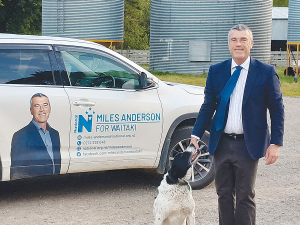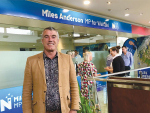Waitaki MP and primary production select committee deputy chair Miles Anderson has taken a swing at "uninformed" farming critics during his maiden speech to Parliament.
Anderson, a South Canterbury sheep and crop farmer and former Federated Farmers meat and wool chair, won the Waitaki seat for National at last year's election.
During his speech, the new MP outlined his family background, motivation for entering the political fray, as well as his long association with Fed Farmers.
"Fed Farmers is an incredible organisation that does an enormous amount of policy and advocacy at a local, regional and national level that goes unnoticed by many in the rural sector," Anderson told the House.
"Being on the board gave me a good introduction to crisis management because of the myriad of unplanned disasters that occur in any given year - whether they are climatic, bureaucratic or biologic."
He added that when his term at Feds ended in 2020, he was drawn into politics "mainly because I feel farming has been given a raw deal by decision makers and mainstream media who, for the most part don't understand the first thing about the rural sector".
Anderson told Parliament that current farming sentiment is the worst he has ever seen.
"Farmers are leaving the industry due to unworkable regulations. These are costing enormous amounts of money, eroding property rights and are ridiculously time consuming," he explained.
"It is the family farms that have been most affected: generally a husband and wife team who work long hours, for not a lot, because they love the land, the environment and have an intimate understanding of their property."
Anderson added that to see farmers unfairly targeted by decision makers, NGOs and some media was "disgraceful".
"It has come to a point where a number of my farming colleagues won't admit they are farmers when socialising in urban settings due to the amount of vitriol they receive from people whose information has come from unbalanced media and NGOs pushing a narrative that is far from truthful," he told Parliament.
"The simple fact is, it's hard to be green if you are in the red!"
Anderson also acknowledged the numerous other new MPs with a direct link to the primary industries who have been elected to the House.
"It (the primary sector) is the driver of our economy, which I believe has been underrepresented in Parliament in decades."



















